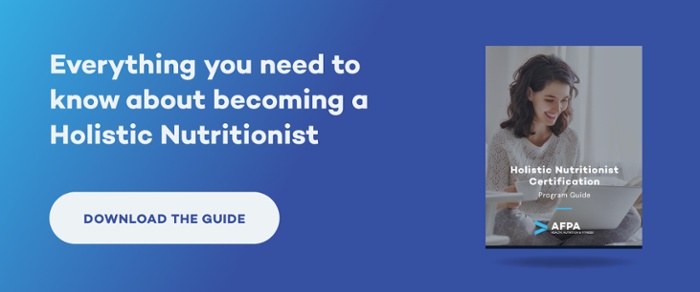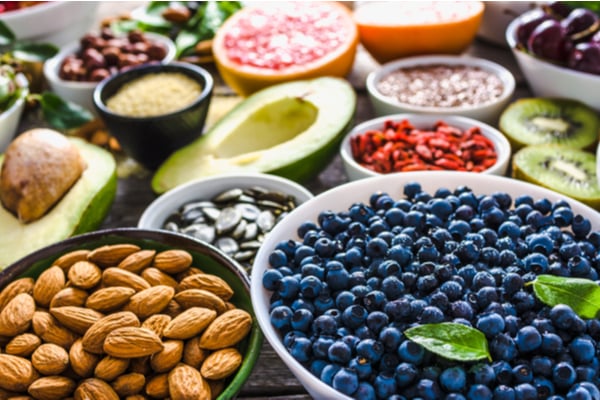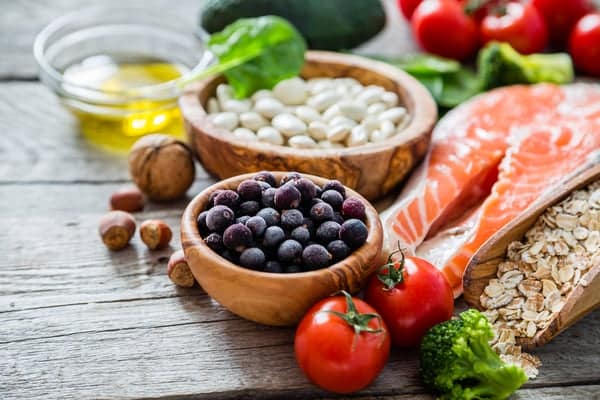As a professional in the health, fitness, and nutrition industry, your role is to help your clients make decisions that will allow them to thrive.
Unfortunately, the desire to look great can often lead to an over-emphasis on the physical benefits of a healthy lifestyle. But making good choices like eating a clean, plant-based diet will do more than just make your clients’ physiques look good; it will also help their brains to function at their optimal state, and this, as much as anything, should be one of the main motivators behind striving to eat well.
The following twenty foods can help your clients (and you!) feel and function optimally by reducing inflammation, protecting against brain disease, and improving memory and concentration.
Vegetables
We’ve all been taught the importance of eating your vegetables every day and for good reason. The benefits of a diet rich in veggies are many, including boosting your brain health.
Broccoli
A delicious food with a reputation for grossing out kids, broccoli is one of the healthiest vegetables out there. One of the main ways that broccoli benefits your brain health is by functioning as an antioxidant.
Antioxidants fight oxidation in the body, which is a chemical process that creates free radicals, a molecule that can damage cells and lead to illnesses like heart disease and cancer. Oxidative stress is also related to aging and symptoms such as memory loss, Alzheimer’s, and cognitive decline. In particular, broccoli is rich in glucosinolates, which break down to form isothiocyanates, a type of molecule that is known to reduce the activation of carcinogens.
Additionally, broccoli contains high levels of vitamin K, which is necessary to form a specific type of fat that resides within brain cells. Higher vitamin K intake has been linked to better memory and cognitive function.
Beets
Beets are more than just a fun color and a key ingredient in borscht; they’re also incredibly nutritious and good for the brain. They’re high in antioxidants and help reduce inflammation (which is linked to autoimmune diseases, anxiety, and high blood pressure). Beets are also full of nitrates, which help boost blood flow to the brain.
Celery
It might not be the most delicious thing around, but there’s a reason why celery juice is the newest health craze. Celery has antioxidants, and its polysaccharides function as anti-inflammatories, which can help relieve symptoms like joint pain and irritable bowel syndrome.
Leafy Green Vegetables
We hope you like salad because dark, leafy green vegetables like kale, spinach, swiss chard, and collards are great for your brain. They’re high in vitamin E, which has been shown to improve neurological performance, and also contain that vitamin K that makes broccoli so great. And they’re high in antioxidants, lutein, folate, and beta carotene, all of which contribute to slowing cognitive decline.
Plus, a study has even shown that adults who eat one or two servings of leafy green veggies a day experience slower mental deterioration than those who eat no vegetables.
Become a Certified Holistic Nutritionist Online in 6 Months or Less
Fruits
While you’re shopping for veggies, you might as well head over to the fruit section of the produce aisle because fruits are also wonderful for your brain.

Blueberries
The deep color of blueberries isn’t just pretty, it’s also a sign that they’re packed full of flavonoids, a type of antioxidant that is great for brain health. Studies have shown that blueberries have a huge range of benefits for the brain, including improving communication between brain cells, improving memory, delaying short-term memory loss, increasing neuroplasticity, and reducing or delaying cognitive decline and neurodegenerative diseases.
Oranges
When it comes to vitamin C, oranges pack a real punch, containing 100 percent of your daily requirement. And that vitamin C puts in work, preventing mental decline, protecting against Alzheimer’s, and supporting brain health as you age. Plus, it’s an antioxidant, which by now you’ve figured out is a brain health magic word.
Avocado
Packed with vitamin K and folate, avocados protect against stroke by helping prevent blood clots in the brain. They also improve memory and concentration. Plus, the fact that they’re high in healthy, unsaturated fat reduces blood pressure, which is important since high blood pressure is linked to cognitive decline.
Tomato
Not only are they a good source of vitamin C, but tomatoes are also full of lycopene, a powerful antioxidant, reducing the risk of dementia and Alzheimer’s.
See if the CPBNS program is right for you
Download the free program guide.
{% form “cta_form” form_to_use=”92007f71-c6da-4abf-97d3-79fe301ab59a” %}

Oils, Herbs, and Spices
The foods in this category do more than just make your meals delicious; they’re also brain superfoods.

Turmeric
A bright yellow spice that adds both color and flavor, turmeric is, like, really good for you. It has a component called curcumin, which can directly benefit the brain by crossing the blood/brain barrier. Once it’s there, curcumin’s antioxidant and anti-inflammatory properties benefit you in a lot of different ways. They can clear amyloid plaques, which are characteristic of Alzheimer’s. They boost serotonin and dopamine levels, which helps reduce symptoms of depression. And curcumins can boost the growth hormone neurotrophic factor, which helps brain cells grow and delays aging-related mental decline.
Turmeric tastes great in all sorts of dishes, including stews, casseroles, and soups, and can be used to make plant-based scrambled tofu, which is delicious in the morning.
Coconut Oil
With its ability to make your skin and hair smooth and shiny on top of significant brain health benefits, coconut oil should be a staple in your pantry. It’s a natural anti-inflammatory, able to help reduce memory loss with age. Coconut oil is great to use for searing and sautéing because of its smoke point of 350 degrees.
Extra Virgin Olive Oil
If you prefer cooking with olive oil, you’re in luck: EVOO is also great for the brain. It’s full of polyphenols, which fight against amyloid-beta derived diffusible ligands (ADDLs), a protein that can cause Alzheimer’s. Polyphenols also improve learning and memory while fighting age-related diseases. Drizzle some extra virgin olive oil on your salads or mix with balsamic vinegar for a delicious vinaigrette.
Rosemary
Rosemary contains carnosic acid, an antioxidant that helps protect the brain from neurodegeneration, aging, strokes, and Alzheimer’s. Sprinkle it on your soups, salads, casseroles, and stews for flavor and superfood power.
Sage
Another go-to herb for cooking, sage has a long history of use as a brain-enhancing tonic. Studies have confirmed that it can enhance cognitive activity and protect against neurodegenerative diseases like dementia and Alzheimer’s. Sage tastes great with beans, tomato sauces, risotto, pesto, and pasta.
Nuts, Seeds, and Dark Chocolate
We hope you like trail mix because these foods all have wonderful effects on the brain’s health. Eat any of the following foods as a quick, healthy, natural, plant-based snack.
Pumpkin Seeds
Not only do pumpkin seeds contain antioxidants, but they’re also a great source of magnesium, iron, zinc, and copper. Magnesium is crucial for learning and memory and for helping to prevent migraines, depression, and epilepsy. Iron improves brain function and reduces brain fog. Zinc helps with nerve signaling, and low zinc levels are linked with Alzheimer’s, Parkinson’s, and depression. Finally, copper controls nerve signals and reduces the risk of neurodegenerative disorders.
Dark Chocolate
Besides being delicious, dark chocolate is also packed with brain-boosting compounds like antioxidants, flavonoids, and caffeine. That means your daily piece of dark chocolate is enhancing your memory, helping you fight against age-related mental decline, and boosting your mood (though you’ve probably already noticed that particular benefit).
Nuts
Nuts high in omega-3 fatty acids, like walnuts and peanuts, are full of healthy fats, antioxidants, and vitamin E. They can keep your heart healthy which, in turn, keeps your brain healthy. Plus, they are linked to improved cognition, mental alertness, prevention of neurodegenerative disease, a sharper memory, and slower mental decline.
Soy and Grains
Hearty foods you can base a meal around, these plant-based staples are key for brain health.
Whole Grains
With their low glycemic index, whole grains slowly power your body throughout the day, keeping you alert and preventing mid-day brain fog. They’re rich in glucose, which is the brain’s favored energy source, and high in vitamin E, an antioxidant, so bring on the bread, oatmeal, brown rice, and popcorn!
Soy Products
Soy products are rich in polyphenols, particularly the isoflavones daidzein and genistein. These antioxidants reduce the risk of dementia and improve cognitive abilities. To get more soy in your plant-based diet, try tofu, edamame, miso, soy milk, and tempeh.
Drinks
Bottoms up! These common morning drinks are great for your brain.
Coffee
If you can’t get through the day without a cup of coffee, you’ll be pleased to know that a regular dose of caffeine boosts brain health. Caffeine increases alertness, improves your mood, and sharpens concentration. Plus, coffee is high in antioxidants and has been shown to reduce the risk of neurological diseases like Parkinson’s and Alzheimer’s.
Green Tea
Life coffee, green tea’s caffeine improves alertness, focus, memory, and brain performance. It also contains L-theanine, an amino acid that can cross the blood/brain barrier and boost the activity of the neurotransmitter GABA, reducing anxiety and improving relaxation. Green tea is also high in antioxidants and polyphenols, preventing neurodegenerative diseases and protecting from mental decline.
Water
We know it’s not quite a food, but we had to include water on this list as a bonus item. Staying hydrated is essential for optimal brain function, filling in the spaces between brain cells and keeping your mind sharp, your head pain-free, and your moods stable.
The Bottom Line
You’ve probably noticed that this is a rather long and varied list of foods. That’s because a lot of different foods are good for your brain. In fact, if you just tell your clients to focus on eating a healthy, varied diet, they’ll probably be getting these foods in their diet and these benefits to their brain health without having to overthink it. Just emphasize a focus on getting lots of fresh, plant-based whole foods into the diet every day, and your clients should be set. When in doubt, don’t forget the motto: the more color on your plate, the more health benefits you’re getting!




